Olha Leontieva, "I reached where I belong"
Olha Leontieva, "I reached where I belong"
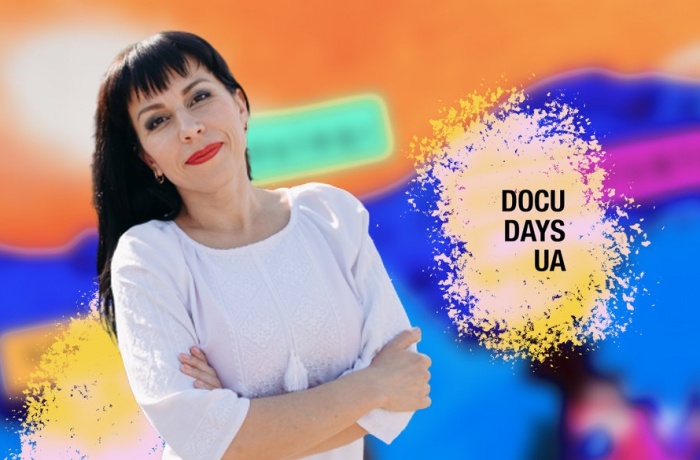
What helps Ukrainians stop tanks with their bare hands and collect millions for bayraktars? The Travelling Docudays UA Festival festival Docudays UA and Suspilne Kultura have prepared ten stories about Ukrainian resilience that will help find answers to these questions. We are publishing a conversation with the regional coordinator of Travelling Docudays UA, Olha Leontieva, about cinemalogy, "hit lists" of people, and the evacuation of people from the occupied city.
Olha Leontieva is the head of the NGO Melitopol Volunteer Group "Patriot", regional coordinator of the Docudays UA International Human Rights Documentary Film Festival in Zaporizhzhia Oblast, head of the film club at the NGO Melitopol Volunteer Group "Patriot". She joined NGO Docudays in 2020. Due to Russia's full-scale invasion of Ukraine, she was forced to leave her hometown of Melitopol. Now she lives in Zaporizhzhia.
MEETING
I first heard about the Travelling Docudays UA Festival in 2018 at training in Mariupol. Someone from the participants brought festival posters. They didn't mention anything specific, but I remembered the name. A few years later, Victoria Veres (regional coordinator in the Zaporizhzhia Oblast, ed.) and I worked on a joint project. She saw the potential of Melitopol, our organisation, and after we finished the work, she said, "Listen, there is a good project, the Travelling Docudays UA Festival. It's definitely for you." I looked and read information about the Festival and got very interested.
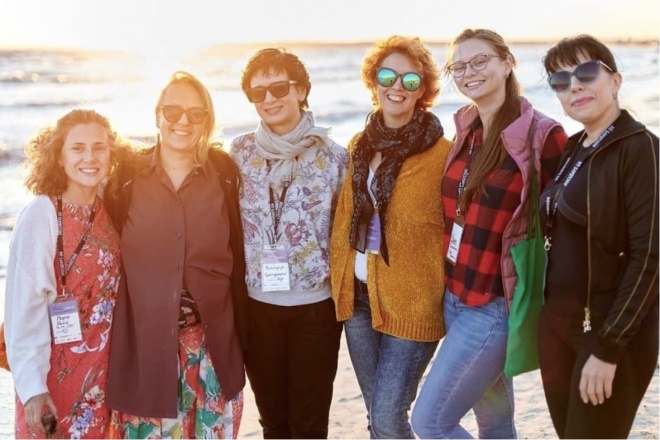
Photo: Olha Leontieva’s archive
The point is that I know what cinemalogy is: it's one of the approaches in psychotherapy when people watch a film together and then discuss it. The first time I saw how it works was in 2016 at a training. We watched one film in a group in one auditorium. But everyone saw something different. I was shocked when people sitting next to me started telling me what they saw in that film, and I, on the contrary, didn't notice those things. My first thought was that something was wrong with me. What saved me from panic was that the guy sitting next to me felt the same way I did. Then we discussed the film, and I saw how this approach works. The discussion allows hearing the other person's opinion and understanding it. This is a platform for dialogue and understanding. People can see the same story in different ways. When I got acquainted with the work of the Festival, I realised that screening and discussing films is one of the tools that will contribute to my work. The NGO "Patriot" helps proactive citizens of Melitopol, who have good socially important initiatives, to unite, get along and create a good project useful for the development of our city.
CINEMA THAT MAKES CHANGES
It so happened that I joined the Travelling Docudays UA Network during the pandemic, and it was a certain challenge for me: how to convince people to join the Festival not only live but also online? But I was sure that I would succeed. I am a good organiser, I have a certain credit of trust, and I know and like to organise people. After the first screenings, I realised that I reached the place where I belong. I love the state of my audience when they leave the event, and their eyes glow with inspiration and hope. I understand that right now, these people are undergoing internal changes.
I had a case when we were holding the Travelling Festival in the schools of Melitopol. In one of the schools, we screened a film about children with disabilities, Karla & Nordahl. Afterward, the students from other classes approached me and asked us to hold an event for them as well. It was a sign that we were doing everything right because the children began to discuss the film among themselves, between classes, asking teachers to stay after classes to watch the film. For adults, we showed the movie 76 days which tells how China lived through the pandemic and lockdown. I invited a girl who was in Wuhan at the beginning of the pandemic to the screening, she told her story and what was happening there. Back then, it was the time when people started discussing whether vaccination was necessary, or maybe it was a conspiracy, so it was kind of a discovery for the students. The discussion helped them to see the situation through a different lens.
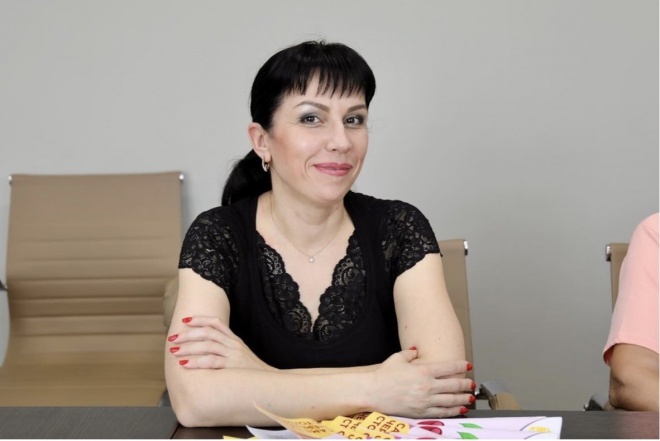
Photo: Olha Leontieva’s archive
WAR
On February 24, I planned to attend a training session in Kramatorsk. But the week before, I got a feeling that I shouldn't go. I really didn't want to go to this event. I even asked the organisers to meet online. And two days before the start, on February 22, we were informed that the coach who organised this event got covid. So I stayed at home. On the 24th, she woke up to terrible explosions: the military airfield in Melitopol was bombed. It was very scary. This fear haunted me for a long time, and I almost stopped sleeping. The idea that someone could just come to another country and bomb was mind-boggling. For some time, I had the illusion that this was a war between the military and civilians would not be affected.
From the first days, the main things we did were the evacuation of people from the occupied city and delivery of humanitarian aid to the city. Although "supply of humanitarian aid" is a strong word, it looked different. We were trying to deliver medicines and basic necessities to the city by any means. We also made free lunches for the poor. And this distribution of lunches was a cover for our fight against the occupiers. While people were standing in line, eating, volunteer girls walked between them, asked about their needs, talked with them, emphasised that we are volunteers of Ukraine, that we would win, reassured them, and reported news, because, since February 25, the city was without communication, Internet connection and light. Over time, it became dangerous to do this, mass disappearances of activists began. We stopped giving out lunches and having "dangerous" conversations. Any mention of Ukraine (the language, the very word Ukraine, said out loud, the color of the girls' manicure, the ribbon on the hand) could turn into a torture for us in the basement.
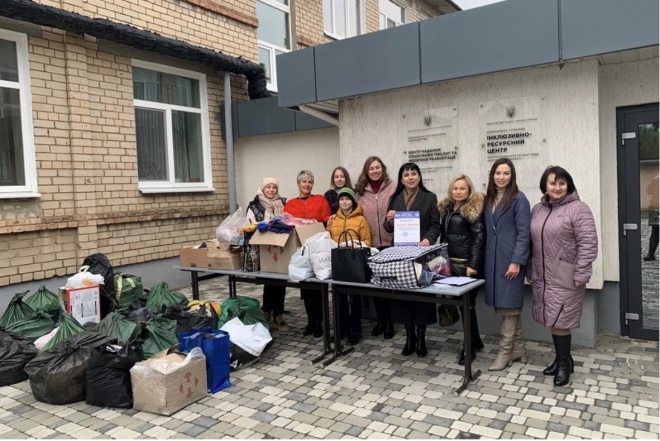
Photo: Olha Leontieva’s archive
ESCAPE
A friend of mine warned me that I had to leave the house immediately because they would come there. I listened to him and did not regret it. They came for me on March 14, as the frightened neighbours later recounted, at 5 in the morning, several cars of armed men arrived, broke down the door, and ransacked the apartment. If I was at home... I don't know if I would have survived that basement. A friend who was there told me: "I spent eight days with a bag on my head, my hands and feet were tied, they took me to the toilet once a day and gave me biscuits once a day."
Then I discovered that I was on the so-called hit list of people and would be searched for. And I left Melitopol. It was very difficult mentally, I did not know where I was going or how everything would end. I changed many places, I was in Novomoskovsk, Kryvyi Rih, Dnipro, and now I'm in Zaporizhzhia. I continue to organise the free evacuation of people from Melitopol and its districts, we are looking for money for fuel, and we bring medicine to the city. First, we evacuated sick people, pensioners, and women with children. There was a case where a woman with gangrene on both legs had to be evacuated urgently, she was waiting for an operation in a regional hospital. She tried to leave quickly, but the orcs did not release special vehicles, because "this is the property of Russia," as they explained. And we evacuated the woman out in the trunk of a minibus because she could not sit.
After the victory, I plan to rebuild Melitopol, to make it even better than it was. The war showed who is who, and there are no more illusions about some figures. Therefore, I already know with whom I will work on the reconstruction of the city. And now I am preparing for the Travelling Festival. I have many plans, we are looking for locations for live screenings in Zaporizhzhia. I hope that Zaporozhzhia residents, who know the Festival and are looking forward to it, will visit the events, and it will also be interesting for people who have temporarily moved. We would like to hold the entire Festival offline, but many of those who are waiting for our films have moved around the world.
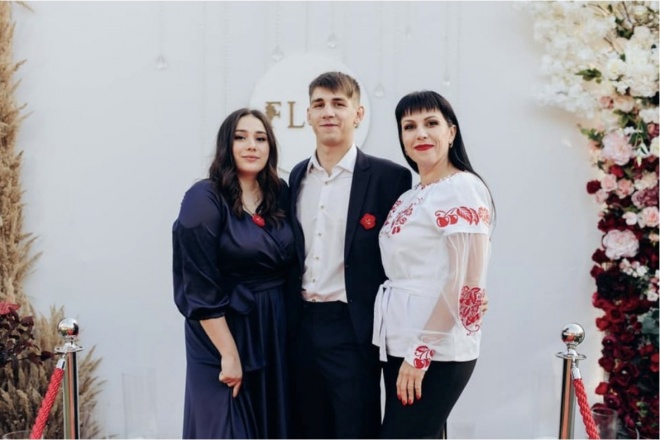
Photo: Olha Leontieva’s archive
The interview was recorded by Tetiana Kulyk.












